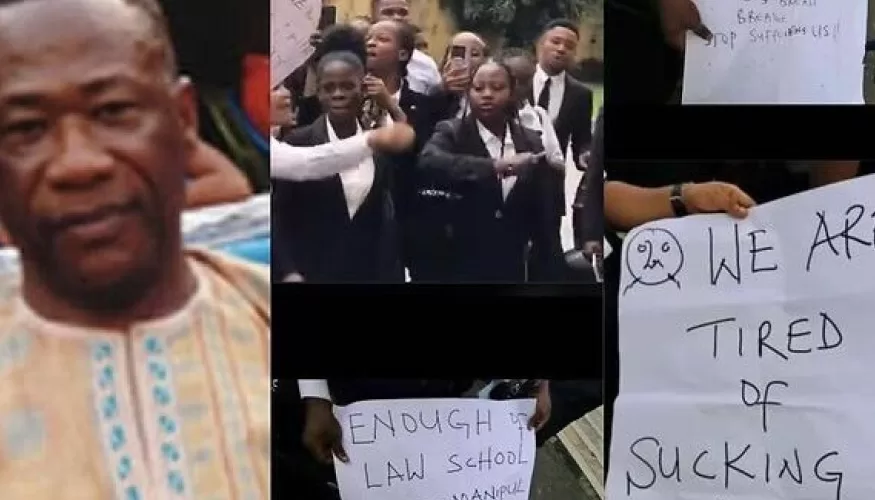EXCLUSIVE: ‘HOW NDIFON SEXUALLY HARASSED STUDENTS, RIGGED LAW SCHOOL LIST’ – UNICAL PANEL (FULL REPORT)
The probe panel set up by the University of Calabar to investigate allegations of sexual harassment of female students, misconduct and abuse of office by the suspended Dean of the Faculty of Law, Prof. Cyril Ndifon, has adjudged him guilty of “gross misconduct.”
In a report of the panel obtained by CITY LAWYER, the panel “established the serial violations of some of the extant rules and regulations.” The report is titled “REPORT OF THE PANEL SET UP TO INVESTIGATE ALLEDGED (SIC) MISCONDUCT, SEXUAL HARASSMENT AND ABUSE OF OFFICE LEVELLED AGAINST PROFESSOR CYRIL OSIM NDIFON, SUSPENDED DEAN OF FACULTY OF LAW, UNIVERSITY OF CALABAR.”
The panel was regaled with accounts of sexual harassment by 10 current and former students of the university, even as one of the witnesses, a 200-level student, told the panel that the suspended Dean told her that “she would be answerable to every sexual call put across to her….” CITY LAWYER participated in some of the panel’s hearings via the Zoom platform.
According to the report, “Prof. Ndifon called her to come to the office the next day and when she came, he locked the office and brought out his penis and told her that if she sucked his penis, he would accept her into the Faculty. After much pressure from the suspended Dean and feeling frustrated, this survivor gave in and sucked his penis and almost got choked as Prof. Ndifon held her head while forcing his penis into her mouth.”
The panel report also contains details of “24 mobilized students for law school Admission whose results were not cleared,” indicating that the Nigerian Law School list from the university may have been rigged by the suspended Law teacher.
In one instance, the panel stated that “This candidate’s name is not in the screened list of the final year law students. However, she is mobilized for law school.” In another case, the panel stated that “Further (name withheld) did not take Jurisprudence a core course but is mobilized for law school.”
On “Major Misconduct,” the panel “established that the suspended Dean, Prof. Cyril Osim Ndifon was using his official position to both intimidate and bargain for sexual favour from female students in the Faculty of Law.”
Turning to “Gross Misconduct,” the panel “established that the suspended Dean had been involved in students’ exploitation. Elaborately, he had been perpetrating cruelty against students by forestalling the graduation of especially some female students at the appropriate time by withholding and refusing to release their results and threatening some that they would never graduate from the Faculty or go to the law School.”
The panel also “established that the suspended Dean was compelling the law students to pay for a Faculty Journal that was non- existent for three consecutive academic sessions.”
The panel recommended “That the suspended Dean of law should face the statutory Disciplinary Committee of the University of Calabar for appropriate sanctions applicable to acts of both Major and Gross – misconduct. The panel makes this recommendation in view of Prof. Ndifon’s antecedents in the Faculty of Law, which from the testimonies given by both staff and students are in clear violations of the extant rules and regulations governing the conditions of service of staff of the University of Calabar. He has used his position as a lecturer and his position as Dean of the Faculty of Law for non- edifying purposes, frustrating, traumatizing and jeopardizing the future of some of the students, as well as the lecturers.”
It also recommended that “The suspended Dean should be made to refund over three million naira (N3m) realized from the payments made by the law students for the Law Journal which he neither published nor gave to the students.
“That the acting Dean should without delay arrange internal defense for Barrister Anne Eruegi Agi to defend her Ph.D and encourage same to put in for promotion in the next promotion exercise.
“That the university should make a rule to stop lecturers from asking students to come and see them at odd (after official) hours and if need be, encourage the culture of not locking their offices when consulting with students. This is consistent with global best practice.
“The university should bend backwards so as to come to the aid of some law students who have been roaming around because of the lapses in the Faculty of Law over the years. There should be a call for such to come for supplementary examinations or mop up. This will go a long way to help the University gain the confidence among stakeholders and prove to the wider society that the University cares and is not indifferent.
“Further steps should be taken to clean up the mess in the Faculty of Law. The seeds of discord planted over the years need to be uprooted. The culture of borderization seems to be entrenched both among staff and students. Such is unhealthy for academic standards, discipline and merit…. It is indeed possible with God on the side of the University for old things to pass away and for everything to become new in the Faculty of Law, University of Calabar, Calabar.”
The report stated that Ndifon “was properly invited thrice by the Panel to come and defend himself but he failed to appear. The invitations were done through written memos, text and WhatsApp messages, as well as radio announcements. The panel had to rely on his responses to the 10 point query issued to him by the University as guidance.”
One of the terms of reference for the panel was “To thoroughly investigate cases of sexual harassment and molestation levelled against the suspended Dean of Law by female students and others who may have felt victimized.” Regarding this term of reference, the investigation panel received sworn statements from students and alumni of the Faculty of Law, University of Calabar, three written and signed statements from other survivors of same. Five alumni gave evidence via zoom while four current students appeared in person and gave evidence as follows ….”
CITY LAWYER recalls that some students of the Faculty of Law had protested alleged sexual harassment and other infractions by the suspended Dean of Law.
Though Women Affairs Minister, Mrs. Uju Kennedy-Ohanenye had told CITY LAWYER that Nigeria’s First Lady, Senator Oluremi Tinubu had waded into the matter, UNICAL Vice Chancellor, Prof. Florence Banku Obi told CITY LAWYER that the university would leave no stone unturned to get to the root of the allegations.
According to Obi who spoke while receiving the report, copies of the report will be submitted to Ohanenye; Education Minister, Prof. Mamman Tahir (SAN), and the National Universities Commission (NUC).
To download the report, click here.
To join our CITY LAWYER Channel on WhatsApp, click here
To join our Telegram platform, click here
COPYRIGHT 2022 CITY LAWYER. Please send emails to citylawyermag@gmail.com. Join us on Facebook at https://web.facebook.com/City-Lawyer-Magazine-434937936684320 and on “X” (TWITTER) at https://twitter.com/CityLawyerMag. To ADVERTISE in CITY LAWYER, please email citylawyermag@gmail.com or call 08138380083.
All materials available on this Website are protected by copyright, trade mark and other proprietary and intellectual property laws. You may not use any of our intellectual property rights without our express written consent or attribution to www.citylawyermag.com. However, you are permitted to print or save to your individual PC, tablet or storage extracts from this Website for your own personal non-commercial use.

